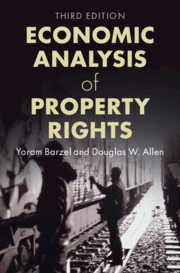Book contents
- Frontmatter
- Contents
- Figures
- Tables
- Preface to the Third Edition
- Preface to the Second Edition
- Preface to the First Edition
- Part I Conceptualissues
- 1 The Neoclassical Problem
- 2 Economic Property Rights
- 3 Transaction Costs
- 4 Information Costs
- 5 The Theory of Economic Property Rights
- Part II Contracts, Organizations, And Institutions
- 6 Exchange, Contracts, and Contract Choice
- 7 Divided Ownership and Organization
- 8 Institutions
- Part III Establishing Property Rights
- 9 Capture in the Public Domain
- 10 Forming Property Rights
- 11 Benefits of the Public Domain
- Part IV Non-Price Allocation And Other Issues
- 12 Nonwage Labor Markets
- 13 Property Rights in Non-market Allocations
- 14 Additional Property Rights Applications
- 15 The Property Rights Model
- References
- Index
- Political Economy of Institutions And Decisions
1 - The Neoclassical Problem
Published online by Cambridge University Press: 17 August 2023
- Frontmatter
- Contents
- Figures
- Tables
- Preface to the Third Edition
- Preface to the Second Edition
- Preface to the First Edition
- Part I Conceptualissues
- 1 The Neoclassical Problem
- 2 Economic Property Rights
- 3 Transaction Costs
- 4 Information Costs
- 5 The Theory of Economic Property Rights
- Part II Contracts, Organizations, And Institutions
- 6 Exchange, Contracts, and Contract Choice
- 7 Divided Ownership and Organization
- 8 Institutions
- Part III Establishing Property Rights
- 9 Capture in the Public Domain
- 10 Forming Property Rights
- 11 Benefits of the Public Domain
- Part IV Non-Price Allocation And Other Issues
- 12 Nonwage Labor Markets
- 13 Property Rights in Non-market Allocations
- 14 Additional Property Rights Applications
- 15 The Property Rights Model
- References
- Index
- Political Economy of Institutions And Decisions
Summary
The traditional economic model implies that ownership is irrelevant for resource allocation. This result is known as the Coase Theorem. The Coase Theorem is just an idea, not a reality. Its importance comes from understanding its logic. It relies on the assumption of zero transaction costs. When this assumption is violated, then the way ownership is organized matters. Hence, a theory of ownership, or a theory of the allocation of property rights, must be based on models of positive transaction costs.
Keywords
- Type
- Chapter
- Information
- Economic Analysis of Property Rights , pp. 3 - 13Publisher: Cambridge University PressPrint publication year: 2023

